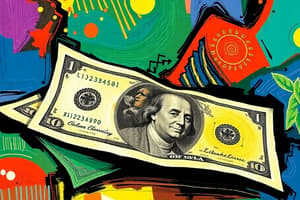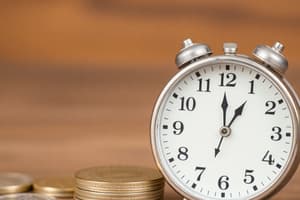Podcast
Questions and Answers
What is the future value of a $100,000 investment at an interest rate of 10% per annum for one year?
What is the future value of a $100,000 investment at an interest rate of 10% per annum for one year?
- $110,000 (correct)
- $100,000
- $105,000
- $95,454.55
What is the present value of a $110,000 cash flow received in one year at an interest rate of 10% per annum?
What is the present value of a $110,000 cash flow received in one year at an interest rate of 10% per annum?
- $105,000
- $95,454.55
- $110,000
- $100,000 (correct)
What is the present value of a $105,000 cash flow received in one year at an interest rate of 10% per annum?
What is the present value of a $105,000 cash flow received in one year at an interest rate of 10% per annum?
- $105,000
- $110,000
- $100,000
- $95,454.55 (correct)
What is the fundamental rule of financial decision-making that states that values can only be compared or combined if they are at the same point in time?
What is the fundamental rule of financial decision-making that states that values can only be compared or combined if they are at the same point in time?
What is the process of calculating a future value over many periods by repeatedly applying the calculation?
What is the process of calculating a future value over many periods by repeatedly applying the calculation?
What is the frequency of compounding that takes into account the effect of interest on interest over an infinite number of periods?
What is the frequency of compounding that takes into account the effect of interest on interest over an infinite number of periods?
What is the process of moving a cash flow from one point in time to another?
What is the process of moving a cash flow from one point in time to another?
What is the term for the process of calculating the value of a cash flow at an earlier point in time?
What is the term for the process of calculating the value of a cash flow at an earlier point in time?
What is the primary reason for converting the interest rate and time period when using the PV and FV formulas?
What is the primary reason for converting the interest rate and time period when using the PV and FV formulas?
If interest compounds semi-annually, how many times a year does it compound?
If interest compounds semi-annually, how many times a year does it compound?
What is the result of increasing the frequency of compounding infinitely in theory?
What is the result of increasing the frequency of compounding infinitely in theory?
To calculate n in the PV and FV formulas, what operation should be performed?
To calculate n in the PV and FV formulas, what operation should be performed?
What is the purpose of moving cash flows across time in time value of money calculations?
What is the purpose of moving cash flows across time in time value of money calculations?
How often does interest compound if it compounds daily?
How often does interest compound if it compounds daily?
What is the result of compounding interest more frequently than annually?
What is the result of compounding interest more frequently than annually?
What is the primary distinction between discrete compounding and continuous compounding?
What is the primary distinction between discrete compounding and continuous compounding?
What is the formula for the future value of a single cash flow?
What is the formula for the future value of a single cash flow?
What is the present value of a cash flow of $100 in 5 years, given an interest rate of 5% per annum?
What is the present value of a cash flow of $100 in 5 years, given an interest rate of 5% per annum?
What is the difference between the frequency of compounding and the number of years?
What is the difference between the frequency of compounding and the number of years?
What is the effect of continuous compounding on the future value of a cash flow?
What is the effect of continuous compounding on the future value of a cash flow?
What is the relationship between the present value and future value of a cash flow?
What is the relationship between the present value and future value of a cash flow?
How does the frequency of compounding affect the present value of a cash flow?
How does the frequency of compounding affect the present value of a cash flow?
What is the formula for the present value of a single cash flow?
What is the formula for the present value of a single cash flow?
What is the effect of moving a cash flow across time on its present value?
What is the effect of moving a cash flow across time on its present value?
How does the interest rate affect the present value of a cash flow?
How does the interest rate affect the present value of a cash flow?
What is the relationship between the frequency of compounding and the number of periods?
What is the relationship between the frequency of compounding and the number of periods?
Flashcards are hidden until you start studying
Study Notes
Time Value of Money
- Interest rates are usually quoted per annum (p.a.) and periods of time are quoted in years, so we need to convert the interest rate and time period to find r and n.
Frequency of Compounding
- Interest can compound:
- Semi-annually (twice a year)
- Quarterly (4 times a year)
- Monthly (12 times a year)
- Fortnightly (26 times a year)
- Weekly (52 times a year)
- Daily (365 times a year)
- To calculate r in the PV and FV formulas:
- Divide the annual interest rate by the number of periods per year
- To calculate n in the PV and FV formulas:
- Multiply the number of years by the number of periods per year
Continuous Compounding
- In theory, compounding periods could become infinitely small, and the number of compounding periods infinitely large
- This is called continuous compounding
- Although interest can’t literally be calculated in this way, many financial valuations involving growth in value other than from interest use continuous compounding
Future Value of a Single Cash Flow
- The general formula for the future value of a single cash flow is: FVn = C × (1 + r)^n
- Where:
- C = the cash flow
- r = the interest rate per period
- n = the number of periods
- FVn = the future value of cash flow C in period n
Present Value of a Single Cash Flow
- The general formula for the present value of a single cash flow is: PV = C / (1 + r)^n
- Where:
- C = the future cash flow
- r = the interest rate per period
- n = the number of periods
- PV = the present value of cash flow C paid in n periods
Rules of Financial Decision-Making
- Rule 1: It is only possible to compare or combine values at the same point in time
- Rule 2: To calculate the future value of a cash flow, you must compound it
- Rule 3: To calculate the value of a cash flow at an earlier point in time, you must discount it
Studying That Suits You
Use AI to generate personalized quizzes and flashcards to suit your learning preferences.




